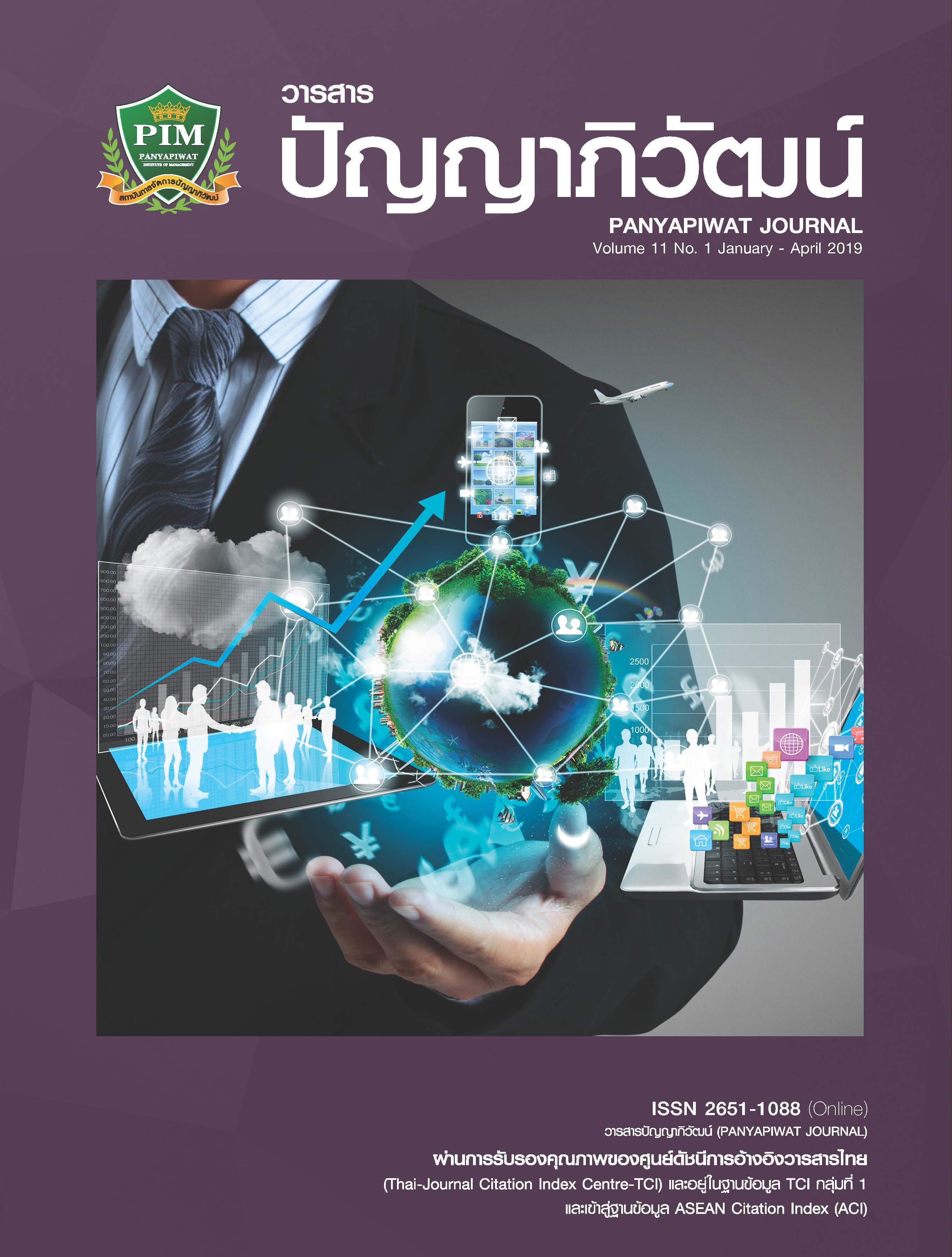อิทธิพลของทรัพยากรในงานและการยอมรับในงานที่มีต่อผลการปฏิบัติงานด้านการบริการ ผ่านความพยายามทุ่มเทของพนักงานฝึกปฏิบัติงานในสถานประกอบการธุรกิจค้าปลีก
Main Article Content
บทคัดย่อ
การวิจัยครั้งนี้มีวัตถุประสงค์เพื่อศึกษา 1) อิทธิพลของปัจจัยเชิงสาเหตุที่มีต่อผลการปฏิบัติงานด้านการบริการของพนักงานฝึกปฏิบัติงานในสถานประกอบการธุรกิจค้าปลีก 2) ตรวจสอบความสอดคล้องของตัวแบบความสัมพันธ์เชิงสาเหตุตามสมมติฐานกับข้อมูลเชิงประจักษ์ โดยใช้แบบสอบถามนักศึกษาของสถาบันการศึกษาเอกชนที่มีสถานะเป็นพนักงานฝึกปฏิบัติงานในสถานประกอบการธุรกิจค้าปลีก จำนวน 680 คน โดยวิเคราะห์ข้อมูลด้วยเทคนิคการวิเคราะห์แบบจำลองสมการโครงสร้าง (SEM) ผลการวิจัยพบว่า ตัวแบบความสัมพันธ์เชิงสาเหตุที่มีต่อผลการปฏิบัติงานด้านการบริการของพนักงานฝึกปฏิบัติงานในสถานประกอบการธุรกิจค้าปลีกมีความสอดคล้องกับข้อมูลเชิงประจักษ์โดยความพยายามทุ่มเทได้รับอิทธิพลทางตรงเชิงบวกจากทรัพยากรในงานมากที่สุด รองลงมาคือ การยอมรับในงานส่วนผลการปฏิบัติงานด้านการบริการได้รับอิทธิพลทางตรงเชิงบวกจากความพยายามทุ่มเทมากที่สุด รองลงมาคือ การยอมรับในงานและทรัพยากรในงานตามลำดับ ทั้งนี้ ความพยายามทุ่มเทเป็นตัวแปรคั่นกลางเพียงตัวเดียวที่มีอิทธิพลต่อผลการปฏิบัติงานด้านการบริการของพนักงานฝึกปฏิบัติงาน
Article Details
“ข้าพเจ้าและผู้เขียนร่วม (ถ้ามี) ขอรับรองว่า บทความที่เสนอมานี้ยังไม่เคยได้รับการตีพิมพ์และไม่ได้อยู่ระหว่างกระบวนการพิจารณาลงตีพิมพ์ในวารสารหรือแหล่งเผยแพร่อื่นใด ข้าพเจ้าและผู้เขียนร่วมยอมรับหลักเกณฑ์การพิจารณาต้นฉบับ ทั้งยินยอมให้กองบรรณาธิการมีสิทธิ์พิจารณาและตรวจแก้ต้นฉบับได้ตามที่เห็นสมควร พร้อมนี้ขอมอบลิขสิทธิ์บทความที่ได้รับการตีพิมพ์ให้แก่สถาบันการจัดการปัญญาภิวัฒน์หากมีการฟ้องร้องเรื่องการละเมิดลิขสิทธิ์เกี่ยวกับภาพ กราฟ ข้อความส่วนใดส่วนหนึ่งและ/หรือข้อคิดเห็นที่ปรากฏในบทความข้าพเจ้าและผู้เขียนร่วมยินยอมรับผิดชอบแต่เพียงฝ่ายเดียว”
เอกสารอ้างอิง
Bakker, A. B. & Demerouti, E. (2008). Towards a model of work engagement. Career Development International, 13(3), 209-223.
Chaiakpuya, P. (2008). The relationship between performance management systems and the job performance of employee. The Master of Science in Human Resource Management Program, Sripatum University. [in Thai]
Cooper, D. R., Schindler, P. S. & Sun, J. (2006). Business research methods (9th ed.). New York: McGraw-hill.
Corporate Leadership Council. (2014). Driving Performance and Retention through Employee Engagement. Retrieved March 16, 2018, from https://www.stcloudstate.edu/humanresources/_fles/documents/supv-brown-bag/employee-engagement.pdf
Coste, A. I. & Tudor, A. T. (2013). Service Performance–Between Measurement and Information in the Public Sector. Procedia–Social and Behavioral Sciences, 92(10), 215-219.
Crawford, E. R., LePine, J. A. & Rich, B. L. (2010). Linking job demands and resources to employee engagement and burnout: A theoretical extension and meta-analytic test. Journal of Applied Psychology, 95(5), 834-848.
Cronbach, J. L. (1990). Essentials of Psychological Testing (5th ed.). New York: Harper and Row.
Demerouti, E., Bakker, A. B., De Jonge, J., Janssen, P. M. & Schaufeli, W. B. (2001). Burnout and engagement at work as a function of demands and control. Scandinavian Journal of Work, Environment & Health, 27, 279-286.
Dumrongsanti, C. (2011). The Impact of Intangible Rewards and Leadership Communication Strategies on Talent’s Passion. Master of Science (Human Resource and Organizational Development), Graduate School of Human Resource
Development, National Institute of Development Administration. [in Thai]
Hair, J. F., Black, W. C., Babin, B. J. & Anderson, R. E. (2010). Multivariate data analysis (7th ed.). Upper Saddle River: NJ Prentice Hall.
Harmi, A. & Sooraksa, N. (2016). The Relationship between Person–Organizational Values Fir, Organizational Commitment and Discretionary Effort of Professional Nurse. Srinakharinwirot Business Journal, 7(1), 120-134. [in Thai]
Jaemtim, N. & Sanongyard, J. (2016). Factors influencing Job engagement that affect on job
performance of Nursing Instructors of Boromarajonani collage of nursing, the Ministry of Public health. Journal of Education Research, Faculty of Education, Srinakharinwirot University, 11(1), 51-62. [in Thai]
Jantasang, S. & Thamwattana, K. (2016). A case relationships model between emotional intelligence and perception of justice influencing to organization citizenship behavior supporting staff of Rajamangala University of Technology Krungthep. Panyapiwat Journal, 8(Suppl.), 130-144. [in Thai]
Kandampully, J. (2006). The new customer centered business model for the hospitality industry. International Journal of Contemporary Hospitality Management, 18(3), 173-187.
Kromvatch, K. (2015). Employees’ Work Passion: Related Factors and the Improvement. HROD Journal, 7(2), 87-103. [in Thai]
Likert, R. (1961). New Patterns of Management. New York: McGraw-Hill.
Lloyd, R. (2008). Discretionary effort and the performance domain. The Australian and New Zealand Journal of Organizational Psychology Press, 1(1), 22-34.
Lovelock, C. & Witrz, J. (2004). Services Marketing: People, Technology, Strategy (5thed.). Upper Saddle River, NJ: Prentice Hall.
Madare, J. M., Dawson, M. & Nael, J. A. (2013). Hotel manager’s perceived diversity climate and job satisfaction: The mediating effects of role ambiguity and conflict. International Journal of Hospitality Management, 35, 28-34.
Meijman, T. F. & Mulder, G. (1998). Psychological aspects of workload. In P. J. D. Drenth, H. Thierry & C. J. de Wolff. (Eds.). Handbook of Work and Organizational Psychology. (pp. 5-33).
Offce of Commercial Affairs. (2017). Weekly news from Hanoi. Retrieved March 15, Hove, UK: Psychology Press.2018, from https://www.ditp.go.th/contents_attach/203440/203440.pdf [in Thai]
Offce of the Higher Education Commission. (2018). Total number of students (Bachelor’s Degree), Academic Year 2017, Semester 1. Retrieved March 12, 2018, from https://www.info.mua.go.th/information/show_all_statdata_table.php?data_show=2 [in Thai]
Offce of the Royal Society. (2018). Royal Institute Dictionary. Retrieved March 12, 2018, from https://www.royin.go.th/dictionary/index.php [in Thai]
Parker, S. L., Jimmieson, N. L. & Amiot, C. E. (2010). Self-determination as a moderator of demands and control: Implications for employee strain and engagement. Journal of Vocational Behavior, 76(1), 52-67.
Rhoades, L., Eisenberger, R. & Armeli, S. (2001). Affective Commitment to the Organization: The Contribution of
Perceived Organizational Support. Journal of Applied Psychology, 86(1), 825-836.
Ritcharoon, P., Thaneerat, A., Klaichun, P. & Putinart, C. (2016). Desirable traits study of Panyapiwat Institute of
Management’s Students by using Work-based Learning pedagogy in Convenience Stores. Panyapiwat Journal, 8(1), 200-212. [in Thai]
Robbins, S. P. (1993). Organizational Behavior: Concepts, Controversies, and Applications. Englewood Cliffs, NJ: Prentice Hall.
Rovinelli, R. J. & Hambleton, R. K. (1977). On the Use of Content Specialists in the Assessment of Criterion-Referenced
Test Item Validity. Dutch Journal of Educational Research, 2(2), 49-60.
Sathongvian, A. (2015). Strategy for Sustainable Management of Retail Shop in the Central Region in Thailand.
Panyapiwat Journal, 7(3), 1-9. [in Thai]
Satjatham, P. (2007). Employee Job Satisfaction: Case of YHS International Limited. The Graduate School of Human Resource Development (SHRD), the National Institute of Development Administration (NIDA). [in Thai]
Sing, R. & Setkong, V. (2012). Correlation between motivation and satisfaction in operation with the achievement of employee’s performances in Softel Centara Grand Resort & Villas Hua Hin. Faculty of Management Science, Silpakorn University. [in Thai]
Thiposot, S. (2013). Perceived Organizational Support Affecting Job Performance of Employees in Banking Business. Master of Business Administration, Rajamangala University of Technology Thanyaburi. [in Thai]
Wayne, A., Kaemer, C., Perrewe, P. L. & Johnson, D. (2003). Perceived organizational support as a mediator of the relationship between politics perceptions and work outcomes. Journal of Vocational Behavior, 63(3), 438-456.
Wigraisakda, K. & Jadesadalug, V. (2017). The Effects of Job Demands on Burnout and Affective Commitment of Casual Dining Restaurant Employees, Uttayarn-Auksa Road, Bangkok. Electronic Journal of Open and Distance Innovative Learning (e-JODIL), 7(1), 1-16. [in Thai]
Wonganutroj, P. (2010). Personnel management psychology. Bangkok: Center for Media Promotion. [in Thai]
Yodrakang, J. (2011). The Study of the Effect of Job Resources and Personal Resources Model on Personal Initiative through the Mediating Role of Work Engagement. Faculty of Liberal Arts, Thammasat University. [in Thai]


